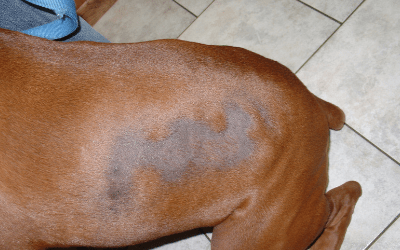What is melatonin?
Melatonin (brand names: Regulin®, Circadin®) is a hormone supplement used to treat a variety of conditions in many different breeds. In dogs, it has been used to treat sleep and behavior disorders and non-allergic hair loss (alopecia). In cats, it has been used to treat sleep and behavior disorders and to suppress the heat cycle. In horses, it has been used to improve breeding rates. In ferrets, it is used to treat adrenal disease. (Image via Wikimedia Commons / Joel Mills (CC BY-SA 3.0.)
Dietary supplements are substances that can be used to supplement the diet, such as vitamins, minerals, amino acids, herbs, botanicals, enzymes, and probiotics. While many supplements are sold over the counter, they still contain ingredients that have biological effects that should be managed by your veterinarian. Follow your veterinarian’s directions and cautions very carefully as their directions may be significantly different from those on the label.
There are differences in how countries regulate supplements. In the United States, these substances are not as vigorously regulated by the FDA as other medications, which means they can be sold without the manufacturer proving their effectiveness, safety, and without a guarantee of consistent or accurately reported ingredients. In Canada, products that have been evaluated for quality, safety, and effectiveness by Health Canada and authorized for sale will have a license number on the label.
How effective is melatonin?
Limited studies in animals have been performed, but there is anecdotal evidence that melatonin works to treat behavioral and sleep issues, adrenal disease, improve breeding rates, and treat non-allergic hair loss.
How is melatonin given?
Melatonin is given by mouth in the form of a tablet, capsule, or liquid. It may be given with or without food; however, if vomiting occurs when dosed on an empty stomach, give future doses with food. Measure liquid forms carefully. It may also be given as an implant placed under the skin in the hospital setting.
This medication will take effect quickly, in about 1 to 2 hours, and improvement in clinical signs should follow.
What if I miss giving my pet the supplement?
If you miss a dose, give it when you remember, but if it is close to the time for the next dose, skip the dose you missed and give it at the next scheduled time, and return to the regular dosing schedule. Never give your pet two doses at once or give extra doses.
Are there any potential side effects?
Studies are limited for this supplement and therefore information regarding side effects is also limited. Side effects are uncommon but may include sleepiness, weight gain, and changes in fertility. The implants have been associated with non-infected abscesses.
In humans, altered sleep patterns, sleepiness, itchiness, low body temperature, and headache have been reported. The significance of these side effects in animals is unknown.
This short-acting medication should stop working within 24 hours, although effects can be longer in pets with liver or kidney disease.
Are there any risk factors for this supplement?
Studies in animals are limited for this supplement and therefore information regarding risk factors is also limited. Do not use melatonin in pets that are allergic to it. Do not give melatonin implants to pregnant or sexually immature (young) animals. Use the oral form cautiously in pregnant or lactating pets.
While the significance of these risk factors in animals is unknown, people with liver, kidney, or heart disease, as well as brain disorders, should use this supplement cautiously.
Are there any drug interactions I should be aware of?
The following medications should be used with caution when given with melatonin: benzodiazepines, succinylcholine, or warfarin. Melatonin can also decrease cortisol and estradiol levels.
Vitamins, herbal therapies, and supplements have the potential to interact with each other, as well as with prescription and over the counter medications. It is important to tell your veterinarian about any medications (including all vitamins, supplements, or herbal therapies) that your pet is taking.
Is there any monitoring that needs to be done with this supplement?
There is no specific monitoring that needs to be done while your pet is taking this medication. Your veterinarian may monitor your pet to be sure that the medication is working.
How do I store melatonin?
Unless otherwise instructed, store this supplement at room temperature in a tight container and away from light.
What should I do in case of emergency?
If you suspect an overdose or an adverse reaction to the medication, call your veterinary office immediately. If they are not available, follow their directions in contacting an emergency facility.

